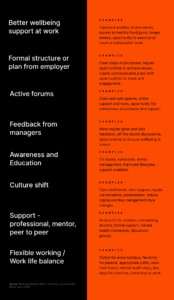
Construction has traditionally been a male-dominated industry, and thanks to the “macho” stereotype that has often gone with this, many workers haven’t felt comfortable talking about their feelings, stress levels and emotions. Even as the industry changes, increasing diversity, employing more women, and promoting better ways to talk about employee wellbeing, the current labour shortage and rising costs post-pandemic are adding additional pressures, and it is crucial for the future of the industry to work together and look after the construction workforce.
According to Construction News’ 2022 Mind Matters survey, 74% of construction industry respondents said there was still a stigma around mental health. Add to this the previously reported statistic that male construction workers are 3 times more likely to die by suicide than the national average with an average of more than one worker a day taking their own life, it is clear that there is a mental health and employee wellbeing crisis in the industry.
Construction industry workers face particular challenges such as:
While the demand for construction work in 2022 has soared, it has also created a new stress related to over-demand and labour shortages. This type of stress is the opposite of the job insecurity experienced during the early days of COVID-19 job but nonetheless, has a detrimental effect on employees.
In the 2019 Mental Health in Construction survey, workers listed the following ways that employers could help to improve employee wellbeing:

It is clear that fostering a culture of understanding and openness around the issues of mental health can help to reduce stress and encourage people to seek help. An example of this, highlighted in the 2022 CN Minds Matter report, comes from Wates’ Group Safety, Health, Environment and Quality Director, John Dunne:
“According to Dunne, larger contractors and bigger firms have worked hard to put systems in place for mental health care. Two years ago, Wates had 100 mental health first aiders. It was then that the contractor set itself the target of having one mental health first aider for every physical health first aider. The count of mental health first aiders is now 275.
Dunne also points to changing trends in the sickness absence statistics for the contractor. Anxiety and depression used to be the second-highest reason for absence, but is now third or fourth on the list, because of the support received.
He says: “What we have found is that a lot of people – certainly up to two years ago – would not report stress, anxiety, depression, or they would not cite that as a reason for being off. They would tend to cite headache, cold or flu, or [their] back because they didn’t want to talk about it. Whereas now what we’re seeing is more people are open to talk about it, so we can actually tackle it. And that helps get people back to work. That’s why we think it’s gone down the sort of list in terms of sickness absence cases.” Source: Mind matters: construction workers reply to CN’s mental health survey | Construction News
Even though the statistics are bleak, the recent survey does show small improvements with 53% of CN’s survey respondents stating they feel comfortable talking about their mental health with colleagues, compared to just 33% in 2019.
Whilst SMEs may not have the resources to implement more ambitious schemes like the Wates’ example cited above, including support for mental health and employee wellbeing as an important part of company values and an internal communications strategy can open up further conversations with employees about their needs, and also contribute towards creating a safe space for talking about mental health at work.
If you or someone you know is struggling with their mental health and needs help now:
Mental health and employee wellbeing industry resources: